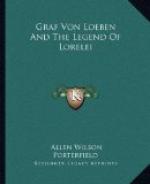As to his poetic ability from the point of view of quantity, one can only marvel at the amount he produced in the time at his disposal; his creative works cover all types and sorts of literature.[4] He is best known for his numerous poems and his magnus opus, Guido, a novel of 360 pages, written under the pen-name of “Isidorus Orientalis,” and intended as a continuation of Novalis’ Ofterdingen; he used Tieck’s notes for this purpose. He wrote also a great number of letters, between 60 and 70 elaborate reviews, and some critical essays, the best of which seems to be his commentary to Madame de Stael’s De l’Allemagne, while he translated from Anacreon, Dante, Guarini, Horace, Ovid, Petrarch, Vergil, and others, and left a number of fragments including the outline of a pretentious novel of which Heinrich von Veldeke, whom he looked upon as “der Heilige des Enthusiasmus,” was to be the hero. And he was, incidentally, an omnivorous reader, for, as he naively said:
Viele BUecher muss ich kennen,
Denn die Menschen kenn’
ich gern.[5]
As to his originality, another confession is significant:
Ja, es gibt nur wenig Leute,
Deren SchUeler ich nicht bin.[6]
No attempt, however, has as yet been made at even an eclectic edition of his numerous finished works, a few of which are still unpublished, many of which are now rare.[7]
As to his standing with his literary contemporaries, Eichendorff admitted[8] that Loeben influenced him as a man and as a poet; it was he who induced Eichendorff to write some of his earlier works under the pen-name of “Florens.” And Eichendorff in turn credited Goethe with the remark[9] that “Loeben war der vorzUeglichste Dichter jener Zeit.” His influence on Platen[10] is not quite so certain; Loeben was Platen’s senior by ten years, and they resembled each other in their ability to employ difficult verse and strophe forms, and Platen read Loeben in 1824. Kleist interested himself in Loeben sufficiently to publish one of his short stories in his AbendblAetter, but only after he had so thoroughly revised it that Reinhold Steig says: “Ich wUerde als Herausgeber die ErzAehlung sogar unter Kleists Parerga aufnehmen."[11] His connection with, and influence upon, the Dresden group of romanticists, including Tieck, is a matter of record,[12] and Fouque looked upon him as a poet of uncommon ability.[13]
But let no one on this account believe that Loeben was a great poet and that the silence concerning him is therefore grimly unjust. Goethe, whether he made the foregoing remark or not, at least received[14] Loeben kindly; but he received others in the same way who were not poets at all. Eichendorff said: “Loeben. Wunderbar poetische Natur in stiller VerklAerung."[15] But Eichendorff was then only nineteen years old, and he later took this back. Herder was moved to tears[16] on reading Loeben’s Maria,




